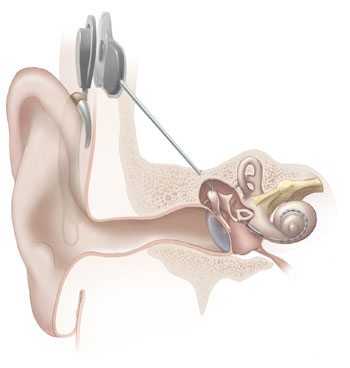This is a very, very long article about deafness, but it’s a very interesting one for people who are not familiar at all with deaf culture. I’m hardly an expert myself, but I took 2 years of ASL in high school, and part of our coursework was learning about deaf culture. What we learned surprised me. The two things that stick out the most are first, the fact that so much deaf humor is based on making fun of hearing people (like you and me). We’re the butt of most of the jokes, and we’re usually depicted as stupid and greedy. Given that I didn’t even realize there was such a thing as deaf culture before taking the class[ref]As a simpler option than other foreign language requirements to graduate high school, no less[/ref], I can see where that resentment and disdain comes from.
The second is that the deaf community[ref]Most folks believe that there is no such thing as “blind culture” because blind people communicate in the same language as seeing people do.[/ref] do not see the inability to hear as a defect. It’s the ticket to entry into their unique culture. For this reason, there are many who view attempts to cure deafness as literally attempts to exterminate their culture and community. Specifically: cochlear implants. These are little electronic devices that bypass the tiny hairs in our ears that help us hear (which are missing, for people that can benefit from CIs) and instead translate vibration directly to electrical signals to your nerves. It’s hearing, sort of. The quality is substantially lower than what people with full hearing can experience, although it is enough to understand speech and advancements are starting to make even listening to music possible.
There are two major problems, however. The first is that children can be diagnosed and given a CI at a very young age, and that once they learn to speak and hear with their CIs, the chance of them ever learning to sign or joining the deaf community are minimal. The second is that many deaf children are born to hearing parents who, overwhelmingly, opt for CIs. As a result, as some in the deaf community see it, they are essentially being robbed of new entrants to the deaf community by a hearing population that doesn’t even really know that they exist.
It’s not hard to imagine a future where virtually all forms of deafness can be cured. Would that be akin to the complete extinction of an entire culture? These are some of the questions raised by this article, which I definitely recommend.
And, the next time someone shares one of those touching YouTube videos of a baby or grown person hearing a loved one’s voice for the first time, just think that the very video that brings tears of joy to a hearing person can bring sadness and loss to a deaf person.

I took the same two years of ASL as Nathaniel. I was terrible at it.
From the article:
If choosing for a child to remain deaf and primarily communicate with sign is the cause of that learning difference, the Deaf community is condemning its average children to life within that conclave. The reading level thing I can sort of get, but math?!? A culture that crippling to the average basic skills of their children clearly has problems.
The Amish and similar communities reach comparable math levels, but they learn reading/writing and useful trades that allow them to travel between cultures with relative ease. It appears Deaf culture does not.
That might be my bad ASL grades or my cultural imperialism talking.
I think the parents should make an informed decision, but ultimately it’s up to the parents and only the parents. If the parents are overjoyed by their kids hearing them for the first time, then good for them. It’s their kids, and they have the right to raise their kids they way they want (subject to the usual caveats about abuse and whatnot else).
Of course, considering some of the bizarre run-ins I’ve seen friends have with CPS, there are plenty of people who think the government can raise kids better than the parents (this was a common theme in socialist utopias of the late 19th century, actually).
As far as Deaf children being behind in learning, math, reading, writing, what not, it has been proven that with the correct access be it American sign language interpreter, or teacher, Deaf or hearing, that are fluent in ASL, these Deaf students can achieve the same high learning levels as a hearing child. Every child learns different, obviously Deaf people are very visual, making higher success rates for them when the access, and correct teaching methods are brought into play.